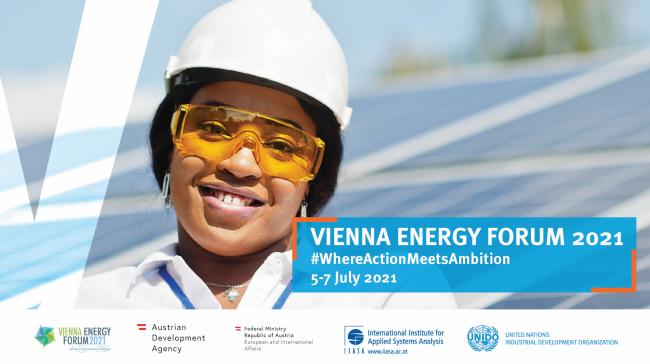Most of the final day of the virtual Vienna Energy Forum 2021 (VEF 2021) focused on “executive dialogues” with roundtables on four themes: re-imagining energy systems; consumers; future mobility; and small island developing states (SIDS). During the closing session, key takeaway messages and conclusions were presented by VEF cosponsors, with five key recommendations identified, namely:
- designing and implementing coherent policies that bring together diverse perspectives but align with development and climate goals;
- working together on allocating funding for research and development to stimulate innovation at the grassroots level, one that stimulates livelihoods and development while taking into account the needs of end users;
- investing in improving the accessibility and affordability of technologies, as well as their suitability for end users;
- transforming educational systems to rethink school curricula to make them more interactive and hands-on, and providing the training and skills for the future, while also re-skilling workers in sectors, such as coal, to bring them on board with the energy transition; and
- promoting data-driven approaches while improving availability and suitability to provide solutions and track them, and to ensure data is not “blind” in a way that adds to inequity for youth and women.
The VEF’s closing also heard remarks from the Director-General of the UN Industrial Development Organization (UNIDO), the UN Deputy Secretary-General, and the Managing Director of the Austrian Development Agency (ADA).
Re-Imagining Energy Systems
The roundtable on “renewable capital” agreed that the availability of financing for renewable energy sources was no longer the problem – instead it was having appropriate and predictable enabling environments, including regulatory frameworks, as well as a pipeline of bankable projects. Since constraints to deploying renewables remain, including intermittence and storage, panelists called for increased public-private partnerships.
The “green grids” roundtable discussed how building a smart grid and interconnected grid infrastructure can drive a renewable energy revolution. It also addressed interconnection within and between countries, which could lead to greater renewables uptake due to the larger scales and better management of power variations, dropping prices and promoting closer economic relationships in the process. However, panelists acknowledged that realizing such a vision will require political will and diplomacy, and possibly the consideration of binational or regional grid regulation structures.
Consumers at the Forefront
The “driving change” roundtable urged avoiding the prevalent sentiment of building a large centralized grid and waiting to see what consumers did with it. Instead, the roundtable proposed a bottom-up approach focusing on end users' true needs, particularly those currently lacking energy access. Panelists highlighted tailoring solutions to encourage rational energy use, generally, and of highly efficient devices, in particular.
The “new services” roundtable agreed that developments in domestic and regulatory frameworks, as well as increased consumer awareness and digitalization, could lead to a shift to the energy-as-a-service (EaaS) model. However, certain constraints remain, including: the monopolies held by many utilities; energy subsidies; outdated regulatory frameworks; complexity of digitalization; and deployment of technology and assets.
Future Mobility
The “green transportation” roundtable discussed the challenges and opportunities in electrifying vehicle fleets, particularly public transport used by most citizens in developing countries and the three-wheeled taxis and delivery vehicles prevalent in the Asia-Pacific. Panelists stressed development of a suitable charging infrastructure. They agreed on the need to keep vehicle electrification within a broader sustainable transport context. They also discussed what to do with the motorized vehicles replaced by electric vehicles (EVs) and how to repurpose batteries, so as not to export or create a waste problem through the transition to EVs.
The “sustainable mobility solutions” roundtable acknowledged the rapid pace of mobility electrification in recent years, but said that more consumer buy-in, stakeholder involvement, availability and accessibility of charging stations, better city planning, and enabling environments were required. While recognizing impediments related to geographic and socioeconomic differences, panelists underscored that mobility electrification also needs to happen in small towns and rural areas.
SIDS
The “resilient networks” roundtable agreed that building resilience in the power sector in SIDS is crucial given their vulnerability to climate change and extreme weather events. However, panelist suggested building a network of mini-grids fed by locally available renewable energy rather than relying on a centralized power grid model may be wiser. Panelists also agreed SIDS cannot access the needed investments without help and that current public funding for energy transition in SIDS is a fraction of what it should be. Some also advocated for creating a supportive ecosystem for incubating locally appropriate energy innovations rather than relying on patented imported technologies.
Panelists in the “blue economy” roundtable concurred that to take full advantage of the Blue Economy, SIDS need to be re-framed as “large ocean states,” to attract investment leading to a green, inclusive and sustainable path. Impediments identified include remoteness, small economic scale, limited territory, and high vulnerability to climate change. The roundtable also discussed the difficulties of scaling offshore wind and solar renewable energy technologies for SIDS.
Closing
UN Deputy Secretary-General Amina Mohammed called for: ending the production and use of coal; requiring every hard-to-abate sector to have an action plan to reach net zero by 2050 with concrete, credible and immediate steps; and aligning public and private financing with the goals of the Paris Agreement.
To get closer to our 2030 and 2050 goals, UNIDO Director General Li urged four key actions:
- announcing ambitious targets and publishing relevant sectoral implementation roadmaps;
- putting into place market-oriented policies;
- unlocking financing at scale; and
- building skills and capacities to fit the future.
Heinz Habertheuer, Interim Managing Director, ADA, stressed Austria's ongoing commitment to helping SIDS address their energy transition challenges, praised the Youth for VEF Forum, and urged greater stress on knowledge sharing, training, and a recognition of the importance of diversity in realizing the SDGs.
Conference Host Sarah Kelly closed the VEF at 5:34 pm CEST.











